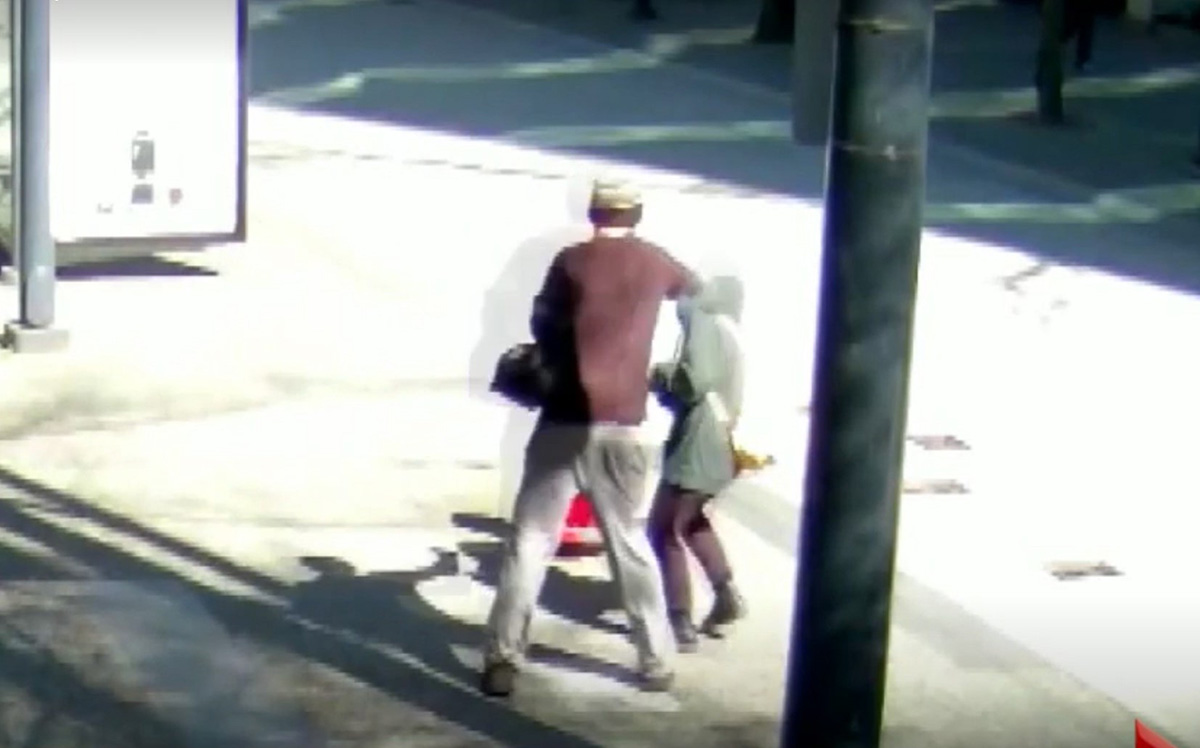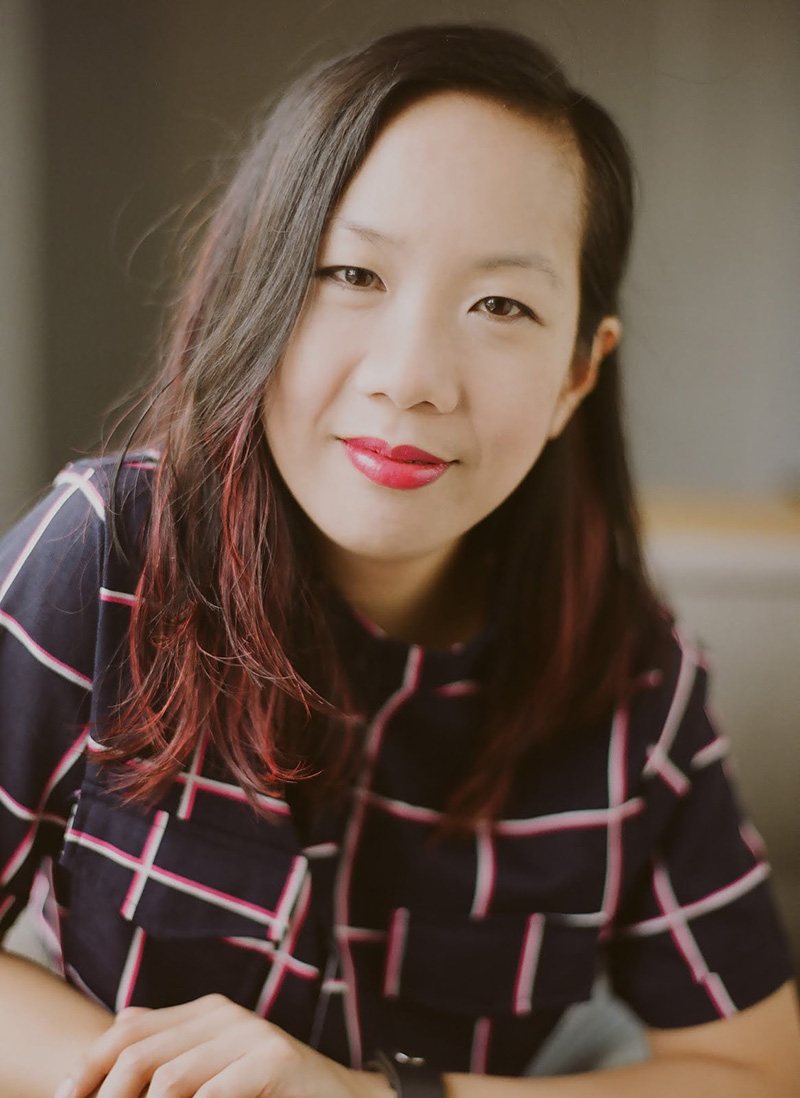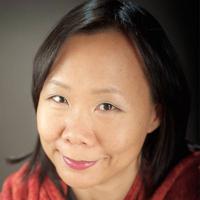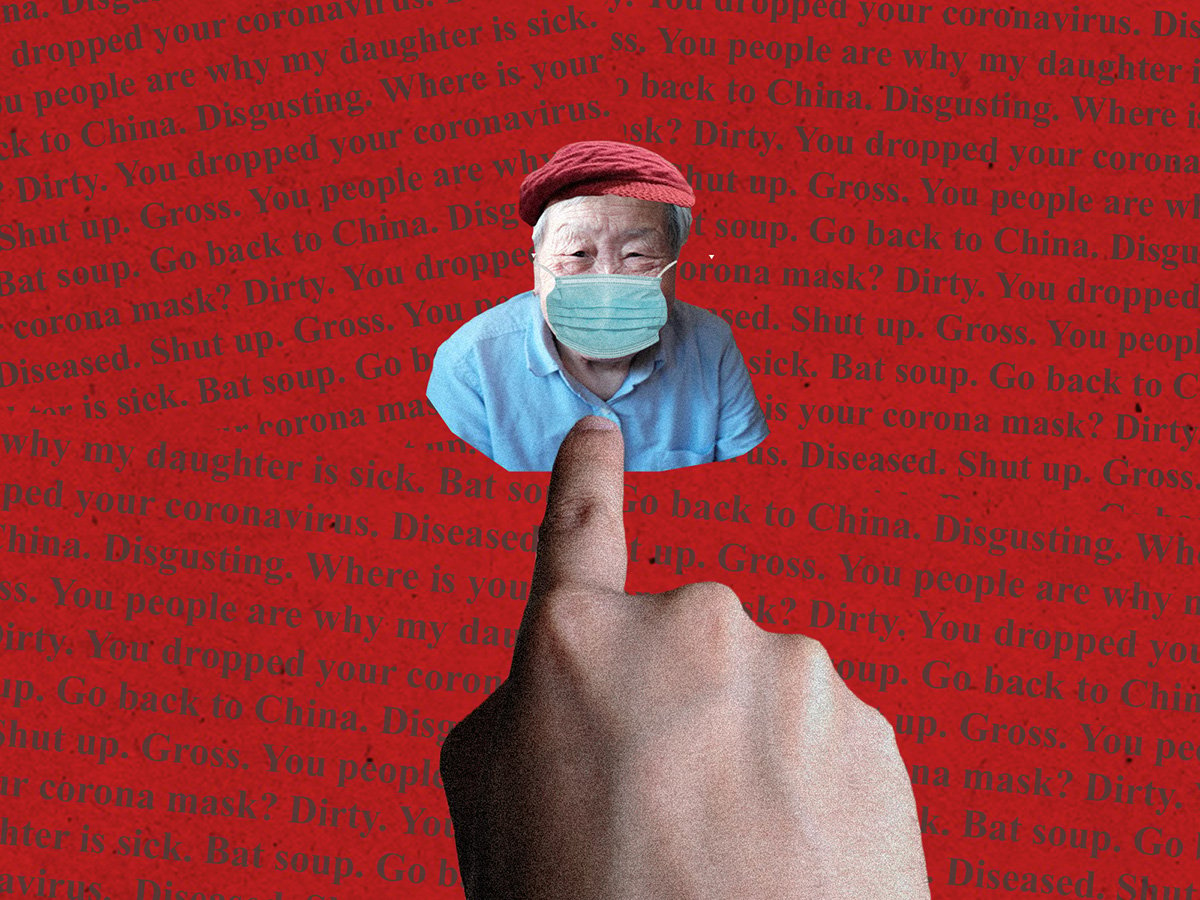Since the start of the pandemic, there has been a disturbing pattern of anti-Asian violence around the globe. As science journalist and author Sonia Shah notes, “Even as public health experts race to contain the novel coronavirus outbreak, a potentially more fearsome and shadowy pandemic — aimed at uninfected people unjustly fingered as potential carriers — grows.”
At a press briefing last Friday, the Vancouver Police announced that hate crimes against people of East Asian descent in Vancouver doubled last month, from five in March to 11 in April, totaling 20 so far this year, a dramatic increase from the 12 registered reports in all of 2019. They also appealed to the public for assistance in catching a man who spray painted four large windows of the Chinese Cultural Centre in Chinatown with racist graffiti a month ago.
On the morning of April 26, a young visible minority woman who had boarded the SkyTrain at Waterfront Station downtown noticed a man staring at her. When she asked him if something was wrong, he screamed “You people are why my daughter is sick!,” punched her in the face multiple times, grabbed her hair and the back of her head in order to slam her face repeatedly into the seats, and then pushed her out of the train when it arrived at Burrard Station. The assailant appeared to have mistakenly assumed the woman was of an ethnic background that he believed was linked to the coronavirus.
Another violent assault occurred on April 12 when a young white male suddenly approached a 22-year-old woman of Asian descent who was standing at a bus stop on Granville and West Pender Street. He punched her in the face, then walked away grinning as she fell to the ground before he boarded the number 4 bus heading toward UBC.
An earlier assault transpired on March 13. A burly Caucasian man entered a 7-Eleven store at First Avenue and Nanaimo Street*, shouted racist slurs about COVID-19 at a 92-year-old great-grandfather suffering from dementia, then forcibly grabbed him by the shoulder and pushed him out the door. When the Chinese-Canadian senior tried to grasp the doorframe to regain his balance, the assailant shoved him hard, causing him to fall backwards and he hit his head on the pavement.
Also in March, Jeongock Choe, a 26-weeks pregnant Korean Canadian, was shopping for mushrooms in a West End Vancouver grocery store when she was told by a stranger to “go back to China.” The victim said she’d never experienced racism like this before. "I started shivering and I started crying because I never, ever thought that would happen to me in Vancouver after living here 10 years."
This rising tide of racist verbal and physical assaults goes significantly beyond isolated incidents related to mental illness. Other cities in Canada have reported a similar onslaught. In Montreal, the lion statues at the Quan Am Buddhist temple were smashed with a sledgehammer, and then smashed again after they were repaired. The lion statues at the gates of Montreal’s Chinatown were also defaced.
There also have been numerous incidents of intimidation and xenophobia against Montrealers of Chinese, Korean and Vietnamese descent. A man of Korean descent was stabbed outside a store. An Asian-Canadian teen was punched in the face on the bus by two men. Racist attackers have apparently even mistaken Inuit people as being Asian, telling them “to go back to your own country,” oblivious to the absurdity and irony of their words.
In Toronto, ER nurse Katherine Cheung was hit with an umbrella by a 60-year-old woman passing by in early April. “She told me to go back to wherever I came from and called me racial slurs. Then she came very close to my face and purposely spit on me.” (Oddly, Toronto police have not been investigating the incident as a hate crime.)

In just a week two activists, Ellen and Doris, have received over 70 reports of COVID-related racist incidents from various cities in Canada via an online form that they started circulating in order to measure and report on the extent of the problem. It is available in several languages. Ellen told the Vancouver Sun that “there is huge range of verbal harassment. A lot of people (report) being coughed at and spat at. There has been unwanted physical contact and vandalism.”
The form they are using is based on the one developed in the United States by the Asian Pacific Policy and Planning Council, a coalition of community organizations, which has gathered almost 1500 reports in the U.S. of verbal harassment, shunning and physical assaults against Asian Americans and Pacific Islanders since the March 19 launch of a community reporting centre.
Shelter-in-place policies implemented across many states should have reduced social interaction, yet Asian Americans have described workplace discrimination, being barred from businesses and transportation, and being refused services. Manjusha Kulkarni, executive director of the Asian Pacific Policy and Planning Council, remarked upon “the impact of hate in the pain, humiliation, trepidation and fear” in the voices of those who have filed reports.
In New York city, a woman was punched and her jaw dislocated by a man who yelled, “Where is your corona mask, you Asian bitch” while another Asian woman wearing a face mask was punched and kicked by a man who claimed she was “diseased.” In San Francisco, an elderly Asian man collecting recyclables was racially taunted, hit with a metal pole and robbed, with the video of the assault proudly posted on social media by one of the perpetrators. In Philadelphia, an Asian couple was mobbed and attacked at a subway station. In Midland, Texas, a Burmese father and his two children, ages two and six, were stabbed by a man who thought they were Chinese and to blame for the spread of COVID-19.
Across the ocean, there have been similar reports, in some cases Asians aiming hostilities at Asians. In South Korea, Japan, Vietnam, Thailand, Hong Kong and elsewhere, there have been attempts to exclude Chinese travellers from restaurants and accommodation. In China itself, businesses and individuals have discriminated against people from Wuhan, and against people perceived as foreigners. It seems no country is immune.
One of the consistent and disturbing patterns with the anti-Asian attacks is the belief by assailants that those of Asian descent are physical embodiments of contagion, even if victims have no connection to Wuhan, Hubei or China, and even though citizens of several other countries have been at least equally as affected by the pandemic.
To counteract this attitude, a teacher in France initiated a Twitter conversation about anti-Asian racism under the hashtag #JeNeSuisPasUnVirus (I am not a virus). There many people have posted their accounts of discrimination.
In Canada, the Chinese Canadian National Council for Social Justice recently published a poll that found 14 per cent of respondents in Toronto, Montreal and Vancouver either believed that all Chinese or Asian people carry the coronavirus (four per cent) or were uncertain (10 per cent).
Some may wonder why racists have assumed people of Vietnamese, Korean, Thai, Filipino, Indonesian, Burmese and other Asian ancestries are Chinese. Were they not taught geography? In her insightful and incisive book, Minor Feelings: An Asian American Reckoning, American author Cathy Park Hong writes that “Chinese is synecdoche for Asians the way Kleenex is for tissues. They don’t understand that we’re this tenuous alliance of many nationalities. There are so many qualifications weighting the ‘we’ in Asian America. Do I mean Southeast Asian, South Asian, East Asian and Pacific Islander, queer and straight, Muslim and non-Muslim, rich and poor?” In short, we look alike to those who refuse to see our diversity.
In her informative essay tracing the history of racial categorization, Canadian author Charlotte Gill states that “ethnicity is brilliantly messy. So is genomic diversity, which we all share regardless of skin tone, thanks to two million years of natural selection. Melanin is just the top coat, the long-lingering trace of a history that exceeds living memory, that survives long after the bonds of language, culture, kinship and religion have been stretched or maintained, broken or cast away.”
Yet despite shared genetic diversity, despite skin color being only skin-deep, and despite the universal truth of stretched and broken bonds, many people persist in clutching onto essentialist assumptions of superiority or inferiority based on skin colour and ancestry to justify their own power and privilege. That “brilliant messiness” that Gill refers to, with all its complexity and diversity, is ignored by those seeking simple answers and easy scapegoats.
This rampant demonizing of the “other” only intensifies during epidemics and times of socio-economic upheaval. Time and time again, we see how the toxic echoes from the past resonate through the racial slurs of the present.

In an interview with CBC, Frank Ye at the Munk School of Global Affairs and Public Policy at the University of Toronto, observed how history seems to be repeating itself. “The spread of this virus, just like the spread of SARS, has been used to bring back a lot of anti-Chinese, anti-Asian tropes and racist stereotypes that really date back throughout centuries in Canada's history. [It's] this idea of 'yellow peril,' of this Chinese horde coming to destroy Western civilization.” It’s alarming to see the same attitudes that led to the Asiatic Exclusion League, the Vancouver Anti-Asian Riots of 1887 and 1907, the 1923 Chinese Exclusion Act and the Second World War internment of over 22,000 Japanese Canadians resurfacing.
Cultural commentator Jenn Fang made similar observations in the Washington Post earlier this year, noting that “racist vitriol ha[d] already permeated online conversation about the coronavirus. An uncanny echo of historic anti-Asian stereotypes dating back to more than a century ago, tweets about the coronavirus have been awash with complaints of Chinese people as ‘backward,’ ‘disgusting,’ ‘dirty’ and having ‘gross’ eating habits. Meanwhile, scientists point out that the general public’s most effective protection against contracting SARS, coronavirus, or even the flu virus is frequent hand-washing — not racism.”
It doesn't help that the health crisis has become politicized. In Canada, Ontario MP Derek Sloan suggested that Canada's Chief Public Health Officer Theresa Tam is actually working for the Chinese government: "Does she work for Canada or for China?" More ominously, U.S. President Trump continues to deflect attention from his government's handling of the pandemic by expressing his government's intention to punish China, suggesting that a government laboratory mistakenly — or even intentionally — released the coronavirus, flying in the face of scientific consensus that the virus is not genetically modified or human-made.
Given the heightened rhetoric and scapegoating leading up to the U.S. election, those with racist leanings may feel that they themselves are “punishing” China when attacking people they perceive to be of Asian heritage or their property, regardless that their victims happen to be their fellow citizens.
Fortunately Premier John Horgan and Prime Minister Justin Trudeau have taken a strong and clear stance against racism. B.C.’s provincial health officer Dr. Bonnie Henry has urged us all “to be kind, to be calm and to be safe.” Even so, there are many Canadians and Americans of Asian heritage who do not feel calm or safe right now given the extent of antipathy around the globe.
Vancouver writer Jen Sookfong Lee recently gave voice to the dread and apprehension that others of Asian descent may be feeling right now. “These days, I often think, ‘I should be careful going outside,’ and I don't think that because of the virus, I think that because of racism. What does that say about the tenuous state that Asians live in? Sometimes we're tolerable, sometimes not and we have no control over that... I am terrified, truly terrified, someone will say something in front of the kid or, worse, to the kid.”
In the U.S., UCLA women’s basketball player Natalie Chou has made similar comments. “For weeks, I have been scared to go outside by myself. I am always alert and tense because I do not know how people will respond to me. People who look like me have been put in danger and have become targets. We are being attacked during a time where unity and togetherness are vital.”
Social distancing and the need to stay home most of the day provide some degree of a buffer. But what will happen when the enforced hibernation comes to an end and something like normal social interaction resumes? Will there be residual blame, suspicion and hostility?
There are moments from the past few months that I doubt I’ll ever forget. The worried expressions of passengers waiting at bus stops or riding public transit with me. The middle-aged man pulling his bandana up over his mouth at the cashier as soon as he spotted me lining up over 10 feet away. Being yelled at for not wearing a mask when cycling up a hill.
I’ll never know the reason for those averted gazes and hostile looks I’ve experienced over the past few months. But I’ve also been heartened by the groundswell of support for the Kwong family whose great-grandfather was attacked in March. By the people who phoned in tips right away to the police that led to the swift identification of the assailants in both the SkyTrain and convenience store assaults. By Joe Henry Doyle, a Downtown Eastside maintenance worker who always tells racist ranters riding on the same bus to “shut up.” By the dozens of non-Asian friends and colleagues who wrote to a local tourism council on the U.S. border to remove references to the “China Virus” on its website. And by my neighbours who clang on pot lids and bang on drums at 7 p.m. for our ethnically diverse frontline and essential workers.
If and when anyone tells me to go back to my own country, I’ll say that I’m already in my own country — as are the venerable Mr. Kwong, or Jeongock Choe, the pregnant woman buying vegetables in the West End, Katherine Cheung, that ER nurse in Toronto, those young women taking public transit, and so many others. I might even hum the national anthem, in case they’ve forgotten that millions of Canadians like me with immigrant backgrounds and ancestry have learned it by heart.
*Story updated on May 7, 2020 at 8:20 p.m. to correct which street the 7-Eleven store is located on. ![]()
Read more: Rights + Justice, Coronavirus, Municipal Politics
















Tyee Commenting Guidelines
Comments that violate guidelines risk being deleted, and violations may result in a temporary or permanent user ban. Maintain the spirit of good conversation to stay in the discussion.
*Please note The Tyee is not a forum for spreading misinformation about COVID-19, denying its existence or minimizing its risk to public health.
Do:
Do not: